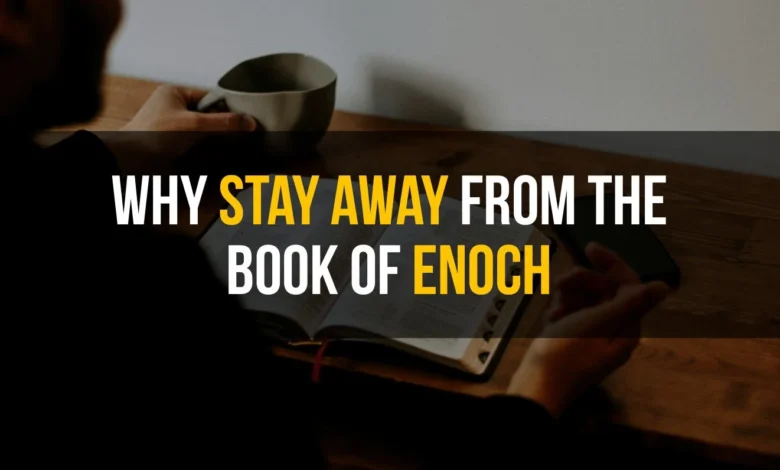Why you should Stay Away from the Book of Enoch

The Book of Enoch is a fascinating and controversial text that has intrigued many people for centuries. However, some religious and academic circles advise caution when engaging with this ancient writing. In this article, we will explore why some suggest staying away from the Book of Enoch, the concerns surrounding it, and the reasons why it has not been widely accepted by mainstream religious communities. By the end, you’ll have a clearer understanding of the issues related to this book and whether or not it’s a text you should explore.
What is the Book of Enoch?
The Book of Enoch is an ancient Jewish text that dates back to the Second Temple period (around 300 to 100 BCE). It is attributed to Enoch, the great-grandfather of Noah, who is mentioned briefly in the Bible (Genesis 5:18-24). According to the book, Enoch was taken to heaven without dying and received divine knowledge. The Book of Enoch describes his visions of heaven, the rebellion of fallen angels, and the coming judgment of the wicked.
Though it has historical significance, the Book of Enoch is not considered part of the official canon of most major religions. For example, it is not included in the Hebrew Bible or the Christian Bible, with the exception of the Ethiopian Orthodox Church, which does include it in their canon. However, it has been a subject of debate and curiosity for scholars, theologians, and even conspiracy theorists. Immediate 6.0 Intal
Reasons to Stay Away from the Book of Enoch
1. Non-Canonical Status
One of the primary reasons many people are advised to avoid the Book of Enoch is that it is not part of the official canon of the Bible in most traditions. Canonical texts are those considered to be divinely inspired and authoritative for faith and practice. The Book of Enoch was not accepted into the Jewish or Christian canons for several reasons, including doubts about its authorship and theological content.
While the book was widely read and respected in some ancient Jewish communities, early Christian theologians, such as St. Augustine and Jerome, rejected its inclusion in the Bible. Since it is not considered divinely inspired, many religious authorities believe that it should not be treated as scripture or relied upon for spiritual guidance.
2. Theological Concerns
The Book of Enoch contains several teachings that differ from or add to what is found in the canonical Bible. For example, it gives detailed descriptions of fallen angels, known as “the Watchers,” who descended to earth and mated with human women, producing a race of giants called the Nephilim. While the story of fallen angels and Nephilim is briefly mentioned in Genesis 6:1-4, the Book of Enoch expands upon these ideas in ways that some theologians find problematic.
Some believe that the teachings in the Book of Enoch could lead to misunderstandings about key theological concepts, such as the nature of angels, sin, and divine judgment. The book’s portrayal of these topics is seen by some as speculative and even potentially dangerous because it can distract from the core messages of the Bible.
3. Potential for Confusion
Since the Book of Enoch is not widely recognized or accepted by mainstream religious traditions, studying it alongside canonical texts can create confusion for readers. Those who are not well-versed in theology or biblical studies might struggle to differentiate between the teachings of the Bible and those of the Book of Enoch.
The book introduces concepts and stories that are not found in the Bible, and this can cause individuals to question or doubt traditional Christian or Jewish teachings. For example, some conspiracy theorists have used the Book of Enoch to promote unorthodox views about the nature of angels, the end times, and human history. reading text files in Python
4. Historical Uncertainty
Another reason to be cautious with the Book of Enoch is the uncertainty surrounding its origins. While the text is ancient, scholars disagree on when it was written, who wrote it, and how much of it reflects original teachings. The earliest copies of the book that have been found date back to around the 3rd century BCE, but parts of the book may have been added or altered over time.
Additionally, since it was excluded from the canon by early religious authorities, there is a lack of scholarly consensus on its reliability. Some parts of the book may have been influenced by pagan or other non-biblical sources, which further complicates its theological value.
5. Not Intended for Mainstream Readers
It is believed that the Book of Enoch was not meant for mainstream audiences but rather for a small, specific group of religious followers. This makes the content even more specialized and difficult to interpret correctly. Many of the themes, visions, and prophecies are highly symbolic and complex, which could lead to misinterpretation by those without a deep understanding of ancient Jewish thought or early Christian theology.
In this sense, the Book of Enoch is not easily accessible to the average reader, which is why many religious teachers recommend staying away from it unless you have a strong background in biblical studies or ancient literature.
FAQs About the Book of Enoch
1. Is the Book of Enoch mentioned in the Bible?
Yes, the Book of Enoch is indirectly referenced in the New Testament in the book of Jude (Jude 1:14-15), where it speaks of Enoch’s prophecy about the coming judgment. However, this is the only place in the Bible where the book is mentioned, and it is not considered part of the official canon.
2. Why isn’t the Book of Enoch included in the Bible?
The Book of Enoch was not included in the Bible because early Jewish and Christian leaders decided that it did not meet the criteria for divine inspiration. There were concerns about its authorship, theological content, and its potential for leading people away from traditional teachings. Blogs Viz
3. Who wrote the Book of Enoch?
The Book of Enoch is traditionally attributed to Enoch, the great-grandfather of Noah. However, scholars believe that it was written by multiple unknown authors over a period of time, possibly during the Second Temple period (300 to 100 BCE).
4. Is the Book of Enoch accepted by any religious group?
Yes, the Ethiopian Orthodox Church includes the Book of Enoch in its official canon. However, most other Christian and Jewish traditions do not recognize it as authoritative scripture.
5. Should I read the Book of Enoch?
Whether or not you should read the Book of Enoch depends on your goals and background. If you’re curious about ancient religious texts and have a strong foundation in biblical studies, it could be an interesting read. However, if you’re seeking spiritual guidance, it’s best to stick with canonical texts that are widely accepted by mainstream religious traditions.
6. Can the Book of Enoch be dangerous to read?
While the Book of Enoch itself is not inherently dangerous, reading it without proper context or guidance can lead to confusion or misunderstandings about core religious teachings. If you choose to read it, it’s important to approach it with caution and seek advice from knowledgeable religious leaders or scholars.
7. Is the Book of Enoch historically accurate?
The Book of Enoch contains historical elements, but much of it is highly symbolic and visionary in nature. Its portrayal of fallen angels, Nephilim, and end-times events is more speculative than historical, which is why scholars advise caution in interpreting it as a historical document.
Conclusion
The Book of Enoch is an intriguing ancient text that offers a glimpse into early Jewish thought and apocalyptic visions. However, its non-canonical status, theological differences, and potential for confusion make it a book that many religious leaders advise staying away from, especially for those without a strong background in biblical studies. If you’re curious about the Book of Enoch, it’s essential to approach it with discernment and understand that it is not considered authoritative scripture by most religious traditions.
By staying informed about the reasons for caution and seeking guidance from reliable sources, you can make an educated decision about whether or not to engage with this controversial text. SEO BANDA



